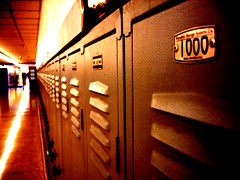 Image by Paradox 56 via FlickrThere's a bizarre current of debate in Oregon where the know-nothings allege that Oregon spends a bundle on schools, with lots of it going to "illegals" (the preferred term among the anti-public-schools crowd for the children of non-citizens, whether their parents are here with proper documents for entry or not).
Image by Paradox 56 via FlickrThere's a bizarre current of debate in Oregon where the know-nothings allege that Oregon spends a bundle on schools, with lots of it going to "illegals" (the preferred term among the anti-public-schools crowd for the children of non-citizens, whether their parents are here with proper documents for entry or not). For the record then, here's a link to a very important piece worth filing away for the next time you're trapped with some gasbag who tells you that we would be fine if we just "got back to basics" and stopped providing so much lavish education, especially to the "illegals." An unusually good article in the local paper, by Betsy Hammond:
Oregon School Spending Trails National Average
PORTLAND, Ore. (AP) — Oregon has firmly established itself as a state that spends 7 percent less per student in public schools than the nation as a whole, according to federal data released last week.
Nationally, U.S. public schools spent $10,500 per student in 2008-09, the most recent year for which statistics have been nailed down for every school district. In Oregon, schools spent $9,800.
Oregon's pattern of spending 93 cents for every $1 spent nationally has become entrenched since 2002-03, when the Legislature slashed school funding as the economy tanked, prompting Hillsboro to lop 17 days off the school year. . . .
What is clear, Tapogna said, is that all trends suggest Oregon schools will continue to have to cut offerings, raise class sizes or shorten the school year in coming years.
"It is going to be, fiscally, a very challenging decade," he said.
Corrections and health care costs are growing faster than the economy, crowding out public schools and particularly higher education from their normal share of state spending, he said. The cost of employee benefits, particularly for the state pension system, is expected to surge in coming years, he said. . . .
A huge infusion of federal stimulus dollars blunted the impact on schools during the past few years, he said, but that money is gone. For next year, "the numbers are going to look really bad. We're not just talking about not climbing very much, we are talking about dropping. ... This will be the worst year that your school districts will have, even though the recession ended a while back."






No comments:
Post a Comment